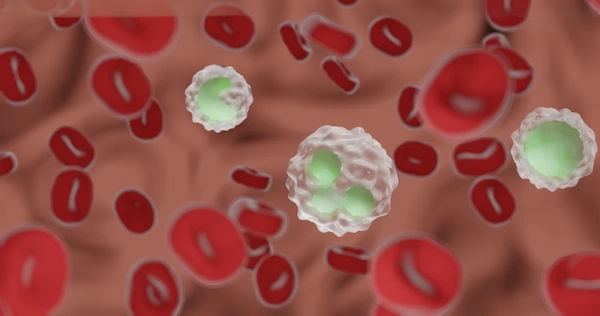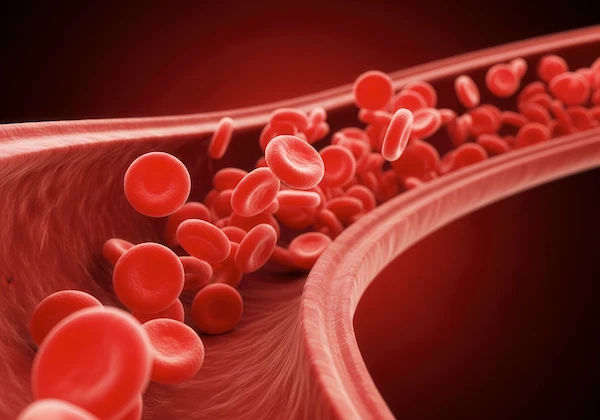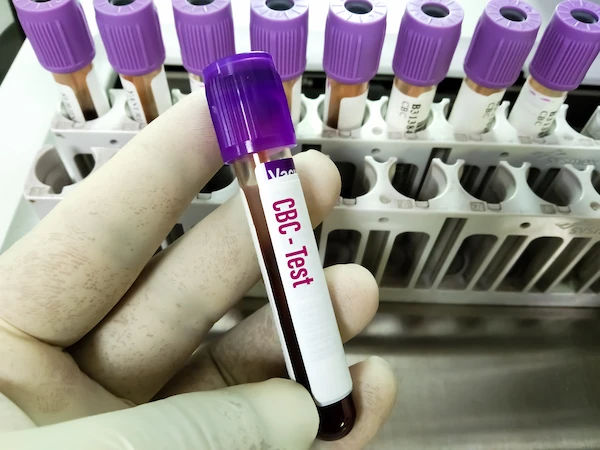Guide to Complete Blood Count Cbc Test
Learn everything about the Complete Blood Count (CBC) test—its purpose, procedure, key components, result interpretation, and what abnormal levels may indicate about your health.

Written by Dr. Dhankecha Mayank Dineshbhai
Reviewed by Dr. Shaik Abdul Kalam MD (Physician)
Last updated on 7th Sep, 2025

What is a Complete Blood Count (CBC) Test?
A Complete Blood Count (CBC) is a common blood panel that provides a detailed overview of the cells in your bloodstream. It's an essential tool that gives your doctor a snapshot of your overall health and can signal a wide range of disorders, from anaemia and infection to more serious conditions like leukaemia. Think of it as a status report on your body's most vital cellular components.
The Purpose of a CBC: More Than Just a Routine Check
While it's a standard part of an annual physical, the utility of a CBC blood test goes far beyond routine screening. Its primary purpose is to evaluate your overall health and detect a wide array of disorders. It helps physicians assess how well your body is producing blood cells, monitor the side effects of treatments like chemotherapy, and diagnose conditions causing symptoms like fatigue, bruising, or fever.
The Three Main Cell Lines Measured
The CBC measures three primary types of cells, each with a critical function:
- Red Blood Cells (Erythrocytes): Carry oxygen from your lungs to the rest of your body.
- White Blood Cells (Leukocytes): Are key players in your immune system, fighting infections.
- Platelets (Thrombocytes): Help your blood clot to stop bleeding.
When and Why is a CBC Test Ordered?
Doctors order this test for a multitude of reasons, making it one of the most frequently performed lab tests.
For Routine Health Screening
As part of your yearly check-up, a CBC with differential provides a valuable baseline. Tracking changes in your blood
counts over time can help identify potential issues early, even before symptoms appear.
To Diagnose a Medical Condition
If you're experiencing symptoms like unexplained fatigue, weakness, fever, inflammation, bruising, or bleeding, a CBC is often one of the first tests ordered. It can help pinpoint the cause, such as identifying anaemia from iron deficiency or signalling a possible bacterial or viral infection based on white blood cell levels.
To Monitor an Existing Condition or Treatment
For patients with diagnosed blood disorders (e.g., anaemia, polycythemia), chronic diseases, or those undergoing
treatments like radiation or chemotherapy, regular CBCs are crucial. They allow doctors to monitor the progression of the disease and the effectiveness (and side effects) of the treatment.
Understandanaemiaur CBC Test Results: A Breakdown
Reading a CBCleukaemiacan be intimidating. Here’s a simple guide to the key components.
Red Blood Cells (RBCs): The Oxygen Carriers
These cells contain haemoglobin, a protein that binds to oxygen. The CBC measures several aspects of your RBCs.
#Key RBC Measurements and What They Mean
RBC count: The total number of red blood cells per volume of blood.
- Haemoglobin (Hb or Hgb): The actual oxygen-carrying protein in your blood. Low levels are a primary indicator of
anaemia. - Hematocrit (Hct): The percentage of your total blood volume that is made up of red blood cells.
- Mean Corpuscular Volume (MCV): The average size of your red blood cells. This helps classify anaemia (e.g., small
cells in iron deficiency, large cells in B12 deficiency).
White Blood Cells (WBCs): The Infection Fighters
The total WBC count measures all white blood cells. An elevated count often indicates an immune response to an infection, while a low count can point to a problem with bone marrow production or a severe infection.
#The White Blood Cell Differential
This breaks down the five main types of WBCs, each with a different role:
- Neutrophils: Fight bacterial infections.
- Lymphocytes: Fight viral infections and are involved in immune memory.
- Monocytes: Engulf and digest pathogens and dead cells.
- Eosinophils: Combat parasites and are involved in allergic responses.
- Basophils: Involved in inflammatory reactions.
Platelets: The Clotting Agents
The platelet count measures the number of cells that form clots to stop bleeding. A low count (thrombocytopenia) can lead to easy bruising and bleeding, while a high count (thrombocytosis) may increase the risk of blood clots.
What Do Abnormal CBC Levels Mean?
It's critical to remember that an abnormal result is not a diagnosis—it's a clueanaemiaour doctor to investigate further.
Causes and Implications of Low Red Blood Cell Count (Anemia)
A low RBC count, low haemoglobin, or low hematocrit indicates anaemia. This can result from:
- Blood loss (e.g., from an ulcer or trauma)
- Nutritional deficiencies (e.g., iron, vitamin B12, or folate)
- Chronic diseases (e.g., kidney disease)
- Bone marrow problems
Causes and Implications of High White Blood Cell Count
An elevated WBC count (leukocytosihaemoglobinignals that your body is fighting an infection. However, it can also be caused by inflammation, physical or emotional stress, or, in rare cases, blood cancers like leukaemia. The differential is high neutrophil count suggests a bacterial infection, while a high lymphocyte count often points to a viral infection.
Understanding Platelet Disorders
- Low Platelet Count: Can be caused by autoimmune diseases, viral infections, certain medications, or bone marrow disorders.
- High Platelet Count:Anaemia is a reactive response to an infection or inflammation, or it can be due to a bone marrow disorder.
The CBC Test Procedure: What to Expect
The process for a CBC blood test is straightforward and low-risk.
Before the Test: Is Fasting Required?
For a standard CBC, fasting is not typically required. You can usually eat and drink normally beforehand. However, if your blood sample is being used for additional tests (like a glucose or cholesterol test), your doctor may instruct you to fast.
During the Test: The Blood Draw Process
A phlebotomist will clean a spot on your arm (usually the inside of your elbow), place an elastic band (tourniquet) around your upper arm to make veins more visible, and insert a small needle to draw blood into one or more vials. The entire process usually takes less than five minutes.
After the Test: Results and Follow-up
You may have slight bruising or tenderness at the needle site. Results are often available within a day. Your doctor will contact you to discuss the findings, often in the context of your symptoms and medical history.
Limitations and Next Steps After an Abnormal CBC
The CBC is a Screening Tool, Not a Final Diagnosis
An abnormal value does not automatically mean you have a haemoglobinous condition. Many factors, anaemic hydration status, altitude, and even pregnancy, can influence your results. Your doctor is the best person to interpret your CBC in the context of your overall health.
Common Follow-up Tests Your Doctor Might Recommend
Depending on the abnormal values, further investigation may include:
Peripheral Blood Smear: A visual examination of blood cells under a microscope.
- Iron Studies: To check for iron deficiency.
- Vitamin B12 and Folate Tests: To investigate types of anaemia
- Bone Marrow Aspiration and Biopsy: If a serious bone marrow disorder is suspected.
Conclusion
Understanding your Complete Blood Count is a powerful step toward active participation in your healthcare journey. While this guide provides a solid foundation for interpreting the basics, it is not a substitute for a professional medical opinion. Your CBC results are a piece of a larger puzzle that includes your symptoms, history, and physical exam. If your results are outside the standard range, view it as an opportunity for further exploration with your doctor rather than a reason for immediate alarm. By asking informed questions and suggesting understanding the purpose behind your tests, you and your healthcare team can work together to maintain your optimal health. Schedule a conversation with your doctor to review your latest CBC and address any concerns you may have.
Consult a Specialist for Personalised Advice
Consult a Specialist for Personalised Advice

Dr. Mohammed Kamran
General Practitioner
5 Years • MBBS, FIDM
Nashik
Apollo 24|7 Clinic - Maharashtra, Nashik

Dr. Jawwad Mohammed Kaleem
General Practitioner
4 Years • MBBS
Hyderabad
Apollo 24|7 Clinic, Hyderabad

Dr. Siri Nallapu
General Practitioner
5 Years • MBBS
Hyderabad
Apollo 24|7 Clinic, Hyderabad

Dr. Rajib Ghose
General Physician/ Internal Medicine Specialist
25 Years • MBBS
East Midnapore
VIVEKANANDA SEBA SADAN, East Midnapore

Dr. Rajesh R
General Practitioner
24 Years • MBBS
Bengaluru
Maruti Polyclinic and dental care, Bengaluru




